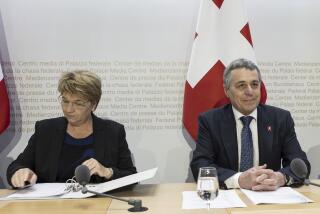EU Plans to Admit Ex-Soviet Bloc Nations : Diplomacy: Envoys from six likely new members attend summit. But accord is faulted for lacking a timetable.
ESSEN, Germany — Leaders of the 12-nation European Union formalized plans Saturday that would open membership to countries of the former Communist East Bloc.
Although EU members were criticized for the absence of any precise timetable, adopting the plan constitutes an important step in extending the push for an economically and politically unified Europe beyond the Continent’s old Cold War divide for the first time.
“Today was a historic occasion for the European Union and for Europe as a whole,” declared German Chancellor Helmut Kohl, who hosted the summit. “Who could have conceived of such a meeting five years ago? This will help us build a Europe that is peaceful and prosperous. We have departed from the past.”
As a gesture to symbolize the EU’s commitment, Kohl invited the leaders of six Central and East European nations being considered for membership to participate in the meeting’s final session.
Referring to the image of the leaders of Poland, Hungary, the Czech Republic, Slovakia, Bulgaria and Romania sitting at an EU summit, Executive Commission President Jacques Delors said: “There is no longer a distinction between East and West. We share traditions, culture.”
However, even for the most advanced of the six, membership may be several years away, according to EU officials.
Under the terms of the plan, the EU will set out a package of laws and regulations that candidate countries must enact to achieve compatibility with the group’s internal market. At the same time, the EU has pledged to support this restructuring with a $6.6-billion aid fund and to liberalize access to its markets for the candidate countries.
Despite Saturday’s step, the most economically advanced of the Eastern countries--Poland, the Czech Republic and Hungary--have complained about the EU’s vague references to membership “around the end of the century.”
“The Czech Republic will reach the point of compatibility soon, several years before the end of the century,” Czech Prime Minister Vaclav Klaus said.
The EU leaders also agreed Saturday to negotiate so-called association agreements covering economic, trade and political ties with the three Baltic states and Slovenia within the next six months. Such accords, considered a prerequisite for nations seeking eventual membership, have already been concluded by the six non-EU nations invited to the Essen summit.
Now considered irreversible, the expansion eastward is certain to transform the nature of the EU.
It is expected to add to the dominance of Germany, which in the years since the fall of the Berlin Wall has become the largest trading partner of most candidate countries. France is likely to be further marginalized politically and economically by the move.
In an attempt to balance the eastward focus, French President Francois Mitterrand, with Italian and Spanish backing, won a commitment for a $3.3-billion aid fund for the Mediterranean region.
While the Essen meeting was billed as the Eastern Europe summit, the leaders spent much of their time on the crisis in Bosnia, finally agreeing on a declaration that underscored Europe’s commitment to a negotiated settlement and expressed support for the U.N. Protection Force.
“UNPROFOR should continue its crucial mission. . .,” it said.
The leaders seemed to be placing their hopes on peaceful ways of pressuring the Bosnian Serbs, calling for tighter control of Serbia’s embargo against its Bosnian cousins. The declaration made no references to the possible use of allied air power to push the Bosnian Serbs toward peace.
More to Read
Sign up for Essential California
The most important California stories and recommendations in your inbox every morning.
You may occasionally receive promotional content from the Los Angeles Times.










